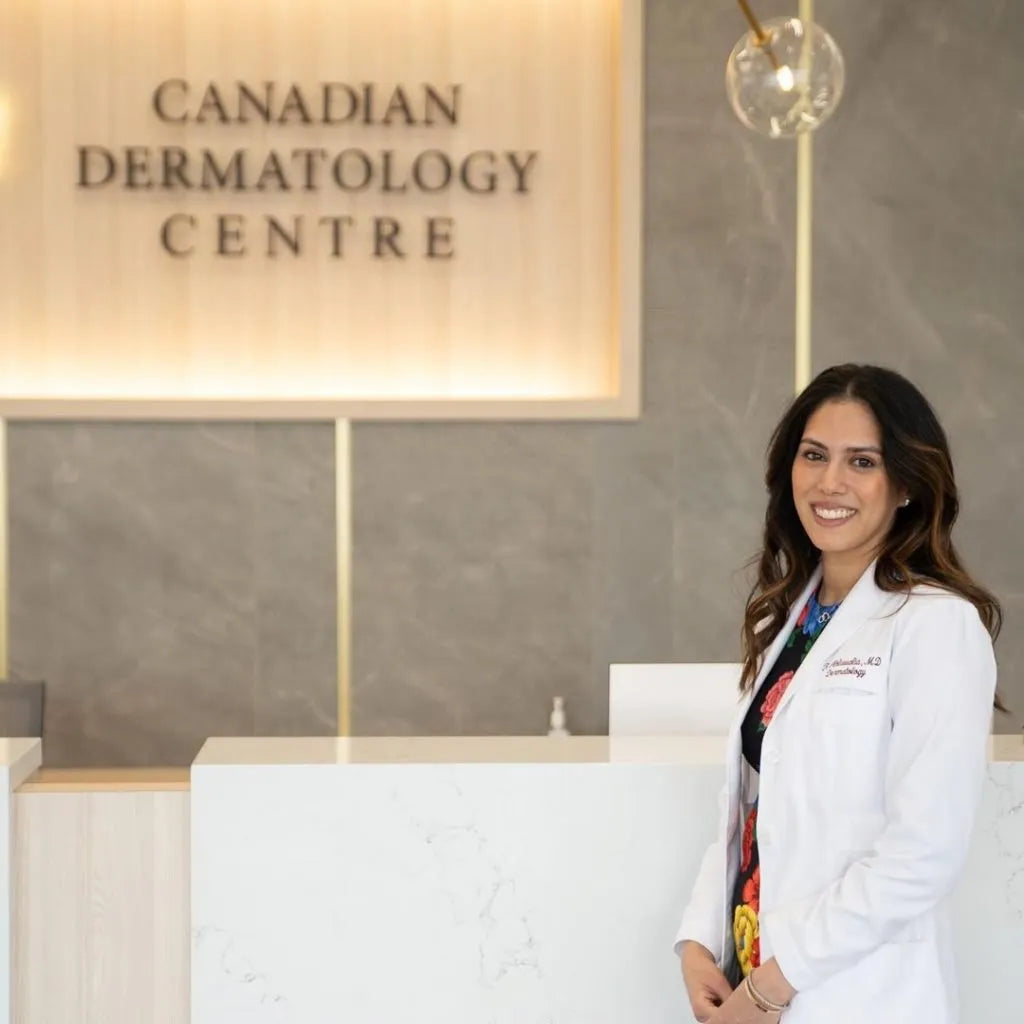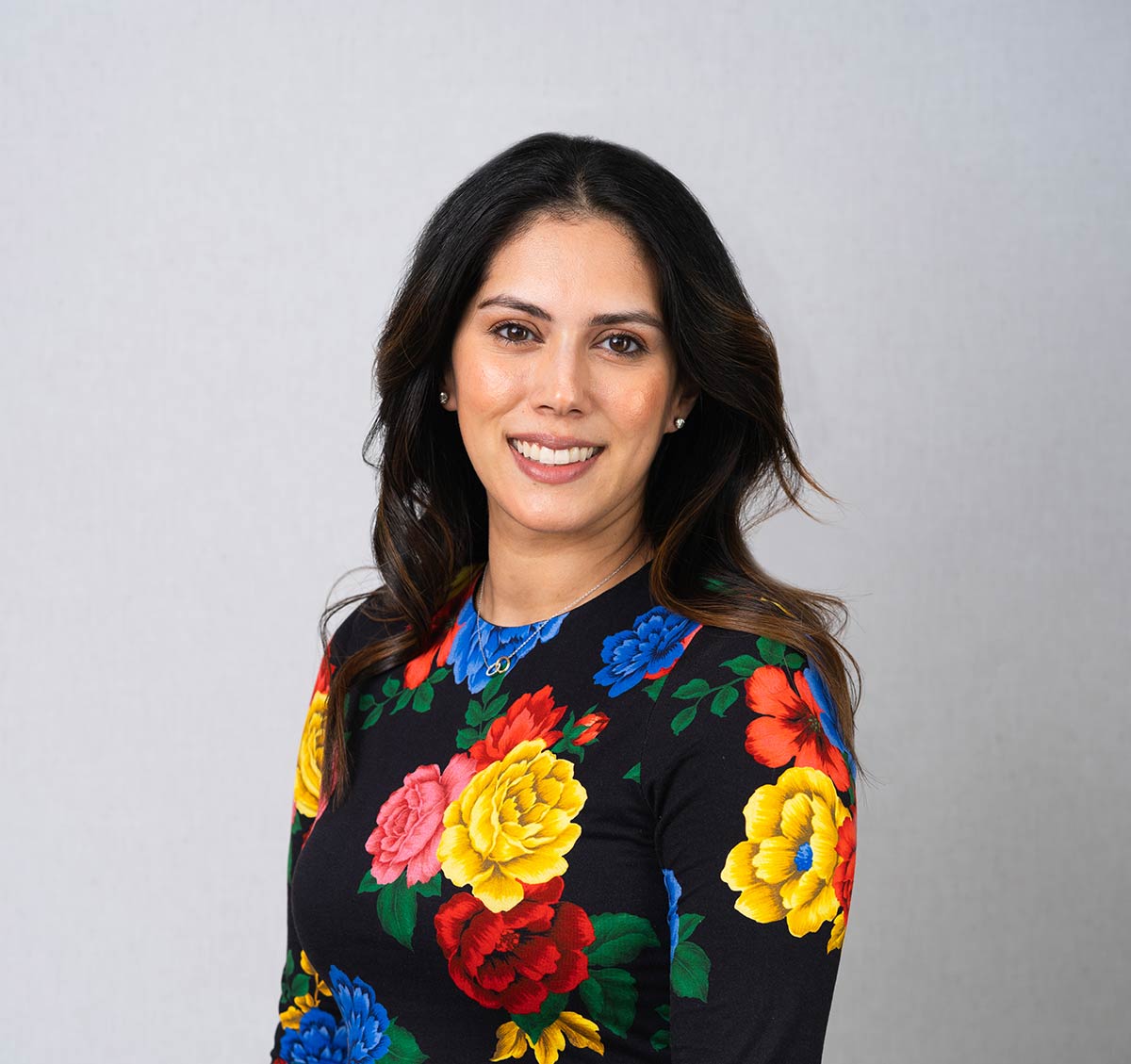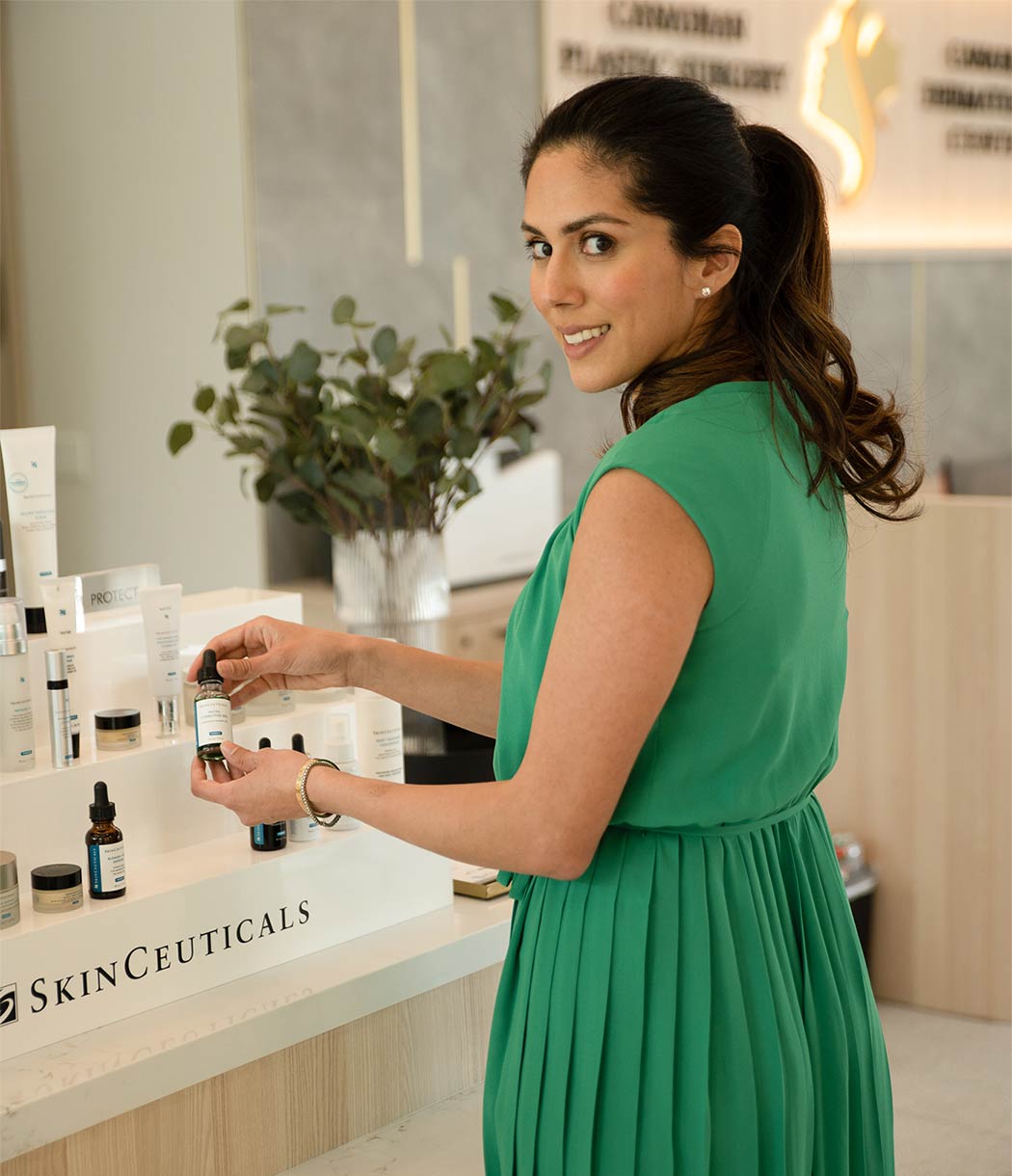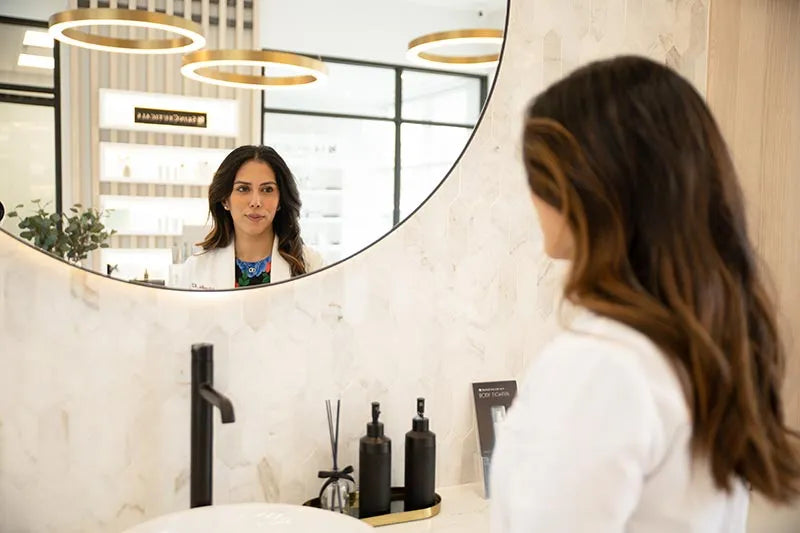A Dermatologist’s Tips for Dry Body Skin in Menopause and Perimenopause

Dr. Renita Ahluwalia
Dr. Renita Ahluwalia is a leading practitioner of medical and cosmetic dermatology.
She is the lead dermatologist at the Canadian Dermatology Centre in Toronto. With a decade of expertise, she holds dual board certifications in Canada and the United States.
Dr. Renita Ahluwalia completed her medical training at the University of Toronto, where she undertook her residency in dermatology, culminating in her role as Chief Resident in her final year. Her academic and professional journey is decorated with numerous awards, underscoring her commitment to excellence in dermatology and patient care.
Her practice, a comprehensive hub for dermatology, plastic surgery, and medical spa services, emphasizes personalized care plans tailored to the individual needs of each patient.
Our founder, Kimia, spoke with her about body skincare in menopause and perimenopause.
Can you tell me about your practice and what you love most about your job?
I have been a dermatologist for 10 years now, and I have a practice called the Canadian Dermatology Center in Toronto. We're a full-service dermatology, plastic surgery, and medical spa. What I love most about my job is that we can look at everyone as an individual and construct personalized 360-degree plans of care for each of our patients. We're able to focus on their medical concerns, cosmetic concerns, and surgical concerns to help them look and feel their best.
As someone who's transitioned from having skin concerns I deeply value it. I can imagine your patients must feel incredibly grateful. Feeling good in one's own skin is genuinely priceless.
It's true. When you feel more confident about your skin, you do feel better overall. I see kids who come in with severe skin issues, or even adults dealing with menopause and perimenopause. During these times, hormonal changes can significantly affect confidence. Once we're able to clear their skin and they begin different types of treatments, you can see a change in their confidence levels, and I love being able to see that and be part of it.
What is most common body skin health concerns you encounter in women aged 45 to 65?
A lot of my patient base is actually women aged 45 to 65, and they have a wide variety of concerns. A lot of them have to do with aging, such as facial sagging, dullness, dryness. Around the perimenopausal menopausal time, sometimes as a result of hot flashes and other symptoms, the skin can show more dilated capillaries and get more redness. So, people are concerned about redness. Acne from the hormonal changes is a big issue too. The sagging and less vibrant skin, dullness to the skin, brown spots, overall dry skin like you mentioned, is another important topic that they find frustrating.
Yeah, exactly. From talking to our customers, we hear that they all face these issues.
I think it's so great what you're doing to create awareness and have a brand focused on this. A lot of people are now talking more about perimenopause and menopause, and I think that is important for women to recognize and talk about. And before even entering that phase, it's crucial to have a strategy. Because people get thrust into menopause fairly quickly. In the first part of menopause, estrogen levels dramatically drop, and that translates to a 30 percent decrease in collagen within the first year of menopause. Collagen is what gives the skin that plumpness and structure, so losing it means the skin becomes more wrinkled, lined, sagging, dry, and acne-prone.
Estrogen is important for holding on moisture in the skin, it’s important for oil production in the skin. So, when those levels drop, all these issues become more prominent.

“... before even entering [menopause], it's crucial to have a strategy. In the first part of menopause, estrogen levels dramatically drop, and that translates to a 30 percent decrease in collagen within the first year of menopause... losing it means the skin becomes more wrinkled, lined, sagging, dry, and acne-prone.”
What are some habits and products that can exacerbate the problems of dry skin for menopausal women?
You want to pay attention to your skin. What maybe worked for you a few years ago won't work for you now. A lot of people use retinol as part of their skincare routine, and retinol is a powerhouse ingredient. It helps a lot with collagen stimulation and all these concerns of menopause, but when your skin is dry, you might not be able to tolerate it the way you were able to before. Making sure not to overdo it with the retinol, to pair it with appropriate moisturizers, will be beneficial. People tend to over-exfoliate or scrub their skin, which can also lead to problems. Forgetting to wear sunscreen or not believing in wearing sunscreen is also a big downfall. That's the number one way to protect your skin.
For those with flaky dry body skin, what role does exfoliation play, and what are key aspects of a good exfoliator that menopausal women should pay attention to?
There are two types of exfoliators: physical exfoliators, which include items with a textured surface like various beads and products, and can be applied using a loofah or a different type of cloth. However, physical exfoliation can sometimes be difficult to manage because it's easy to be too abrasive, leading to skin breaks, which can cause more inflammation and dryness. When the skin is broken, moisture evaporates more easily, making it vulnerable to irritants. So with physical exfoliation you have to be more careful.
On the other hand, chemical exfoliation, in the the form of a bit of retinol or alpha hydroxy acids, are excellent for chemical exfoliation. They can be especially useful for menopausal skin, when used in moderation or combined with other hydrating ingredients, as they help to smooth the skin's surface. It's important not to overdo it and to listen to your skin and adapt. So if you’re noticing irritation, then you should ease off on it. Because sometimes, too much of a good thing is a bad thing.
A lot of people with acne run into that problem. They're using a lot of active ingredients and end up drying the skin too much. And then that actually leads to more acne because the skin barrier is compromised. So, a lot of people with acne come in thinking they're allergic to this ingredient or that ingredient, but they're not really allergic. They were just using it not in the right way, and that causes problems.
So everything in moderation and balance.
Yeah I guess that’s something good overall for life, right?

“What maybe worked for you a few years ago won't work for you now... [retinol] helps a lot with collagen stimulation and all these concerns of menopause, but when your skin is dry, you might not be able to tolerate it the way you were able to before.”
What does it mean when a body cleanser strips away the skin's natural oils, and how does it affect the skin of menopausal women?
You want to use a wash that's very hydrating, one that's close to the pH of our own skin or slightly on the acidic side. The pH of our skin is 5.5. Many washes and soaps out there have the complete wrong pH for the skin. Traditional soaps, like Ivory, are around pH 11 – we’ll have to check the exact pH but I think it’s 11. They are not good for the skin barrier, being very drying and irritating. A product that's nourishing, with less scent and fragrance, generally tends to be better for sensitive skin. Another trick is, right when you come out of the shower and the skin is still a little bit damp, to apply your moisturizer then to lock in that moisture. That’s a very helpful tip.
Could you tell us about the skin's natural barrier and why it is important in relation to dry skin? And also, what ingredients help repair it?
So the skin barrier, or the cornified envelope, is the top layer of the skin, and its function is to protect us. It protects the skin, locks moisture in, and prevents irritants from getting into the skin. When that barrier is compromised, you become susceptible to losing moisture through the skin, and irritants can enter, leading to skin problems like dryness, redness, and irritation. Looking for ingredients that mimic the skin barrier, such as ceramides, cholesterol, and fatty acids, found in emollient-type moisturizers, can be very helpful for repairing the skin barrier.
There are two other types of moisturizers: there’s humectants, which draw water into the skin and are lightweight, with hyaluronic acid being a classic example. And the third class is occlusives, which can be very beneficial for dry, compromised skin, with pure shea butter and petrolatum as examples.
Using different types of moisturizers in combination can help maintain moisture in the skin. The types that mimic the ingredients of the skin barrier itself are generally the emollient-type moisturizers. However, when the skin is very dry, using occlusives and humectants, and a combination of moisturizers formulated in the right way, so the skin doesn't get irritated, can be very helpful.

“You want to use a [body] wash that's very hydrating... Another trick is, right when you come out of the shower and the skin is still a little bit damp, to apply your moisturizer then to lock in that moisture.”
If you were to design a complete shower routine for women between 45 and 65 with dry body skin, what would it look like?
Well, everybody's skin is different, and just because you're a woman between 45 to 65 doesn't mean you necessarily need the same thing.
But generally, if we're thinking this age group is complaining about drier skin, itchier skin, and uneven texture and tone, and starting fine lines and wrinkles, for the body, usually what I say, and I actually say it to most people in our winter, is use a nice hydrating wash in the shower.
Don't keep the temperature of the shower too high. And then when you come out, keep the skin damp and lock it in with a moisturizer that can help restore your skin barrier. And for the face, depending on what the person's concerns are, I advocate for everybody to wear sunscreen every day.
That's very important. And I'm a big fan of vitamin C serums for antioxidant properties. Retinols have a lot of evidence combining with alpha hydroxy acids like glycolic acid can be beneficial. And then lots of hydration for the skin of the face too, especially in our winter, especially when you're going through those hormonal changes. So combining those different types of moisturizers, that's probably what I would say for the routine.
What’s the importance of maintaining a routine for long-term body skin health, tone, and texture, particularly for menopausal women?
To get long-term benefits of anything, you have to consistently use it, and that's often what I tell my patients. It takes three months to see if a routine is working and like six months for good results. You have to be patient and you have to listen to your skin and adjust as needed.
But it's important, especially as you go through hormonal changes and menopause, to have healthy skin habits beforehand, if possible. And if you find yourself already in that situation without having established them, it's not too late to start developing those routines. Being consistent over time is key to giving your skin what it's no longer naturally producing.
And there are many ways to strategize ahead of time or when you're in this situation, combining skincare and in-office collagen-stimulating procedures. It's about looking at your overall health and wellness through supplementation, exercise, and diet. It's a comprehensive package.

“Being consistent over time is key to giving your skin what it's no longer naturally producing.”
Where to find Dr. Ahluwalia
Website: https://canadiandermatology.com/
Instagram (clinic): @canadiandermatology
Instagram (personal): @dr.renita.derm


